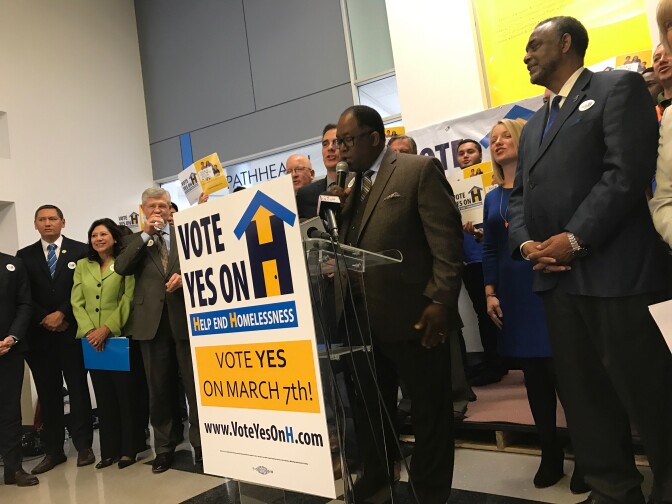This story is free to read because readers choose to support LAist. If you find value in independent local reporting, make a donation to power our newsroom today.
This archival content was originally written for and published on KPCC.org. Keep in mind that links and images may no longer work — and references may be outdated.
Election guide: Everything you need to know about Measure H

Tuesday is Election Day in Los Angeles County and perhaps the biggest item on the ballot is Measure H, a sales tax to fund services for the homeless.
It's a major item for a number of reasons: homelessness consistently comes up as one of the most important issues to voters in L.A. It's also one of the few things on the ballot, and in about 40 percent of the county, Measure H is literally the only thing on the ballot.
Measure H comes down to this: proponents promise that if L.A. County voters agree to raise sales taxes by a quarter percent, they will use the money to end homelessness for 45,000 individuals and families within five years, and prevent another 30,000 from becoming homeless.
Don't know how to vote? Here's a primer to help you make up your mind.
What is Measure H?
This quarter cent sales tax would amount to an extra penny for every $4 you spend on taxable items. The tax could raise about $350 million annually, which would go to the county. By law, the county would spend the funds exclusively on programs designed to reduce and prevent homelessness. Since it is a tax proposed for a specific purpose, Measure H requires 2/3 of the vote to pass. The tax would expire, or come up for voter renewal in ten years.
Wait, didn't we just pass an initiative aimed at ending homelessness?
Voters in the City of Los Angeles passed Proposition HHH in November, a $1.2 billion bond to fund construction of housing developments for formerly homeless to live in.
Members of the L.A. County Board of Supervisors considered putting a companion measure on the November ballot to compliment the city's housing bond — but after examining different options, like a millionaire's tax and a marijuana tax, they couldn't agree on anything in time. Measure H, which they got done in time for the March 7 ballot, is the outcome of those months of talks.
Who's for it?
The measure's supporters include homeless service providers across the county, meaning people who run homeless shelters, run programs for homeless families and individuals, and build affordable and subsidized housing for formerly homeless. It also has a good bit of support from private developers who have contributed money to its campaign.
L.A. County Supervisor Mark Ridley-Thomas is leading the charge for passing Measure H, and he's joined in his support by a wide swath of public officials, including L.A. Mayor Eric Garcetti. The L.A. Chamber of Commerce is also for the measure.
Who's against it?
The measure has no organized opposition and there is no campaign raising money to defeat it, but it does have its critics. Jack Humphreville, a columnist for CityWatch, for instance is skeptical of the county's ability to effectively manage the funds H would raise.
In a panel discussion at KPCC's studios on Wednesday, Humphreville also questioned why the county, which has an annual budget of nearly $30 billion, couldn't find the money to fund such a high-priority issue as reducing homelessness from its own pockets. (The counter to that argument being that much of the county's budget is restricted funds, which they don't have much control over, and public safety expenses.) Humphreville also questioned how the county would oversee the funds to make sure they were correctly spent on programs and services that actually work.
How would the money be spent and monitored?
Ultimately, the L.A. County Board of Supervisors would have final say over which programs the money would fund. They've already started laying the groundwork for how they'd make those decisions should the measure pass.
One of the initial priorities they've identified is expanding L.A.'s emergency shelter system. Should the measure pass, a 50-member advisory group consisting of county leaders, homeless service providers, faith leaders, and public officials would convene and draw up a list of recommendations for funding for the first three years of the tax.
The board would consider their proposals in June. Going forward, a five-member group, appointed by the board, would monitor the funds and an independent auditor would examine them annually.
Ultimately, however, the proof would have to come from the streets. The measure's proponents have promised to make massive reductions in homelessness in Los Angeles County, from Pasadena, to the Antelope Valley, to South L.A. and Santa Monica. It would be up to citizens and the media to figure out whether those promises are kept.







